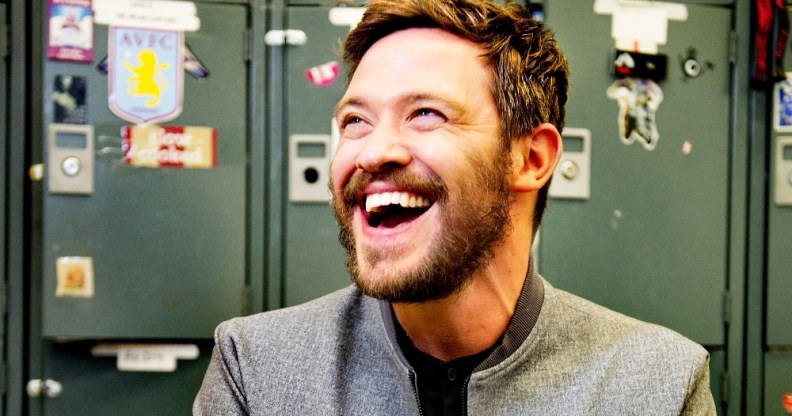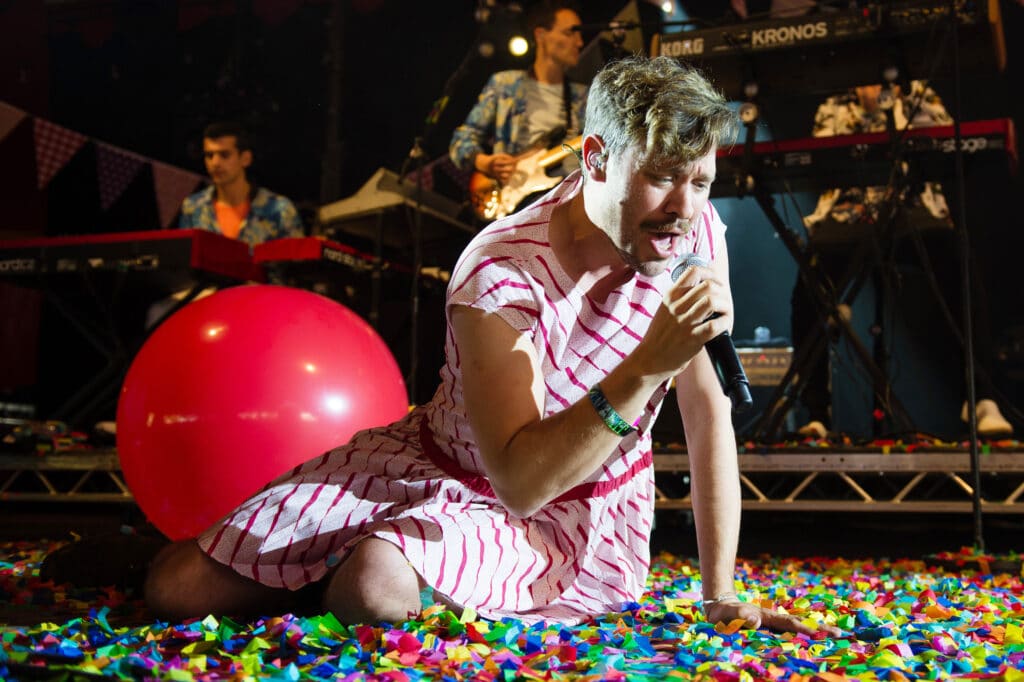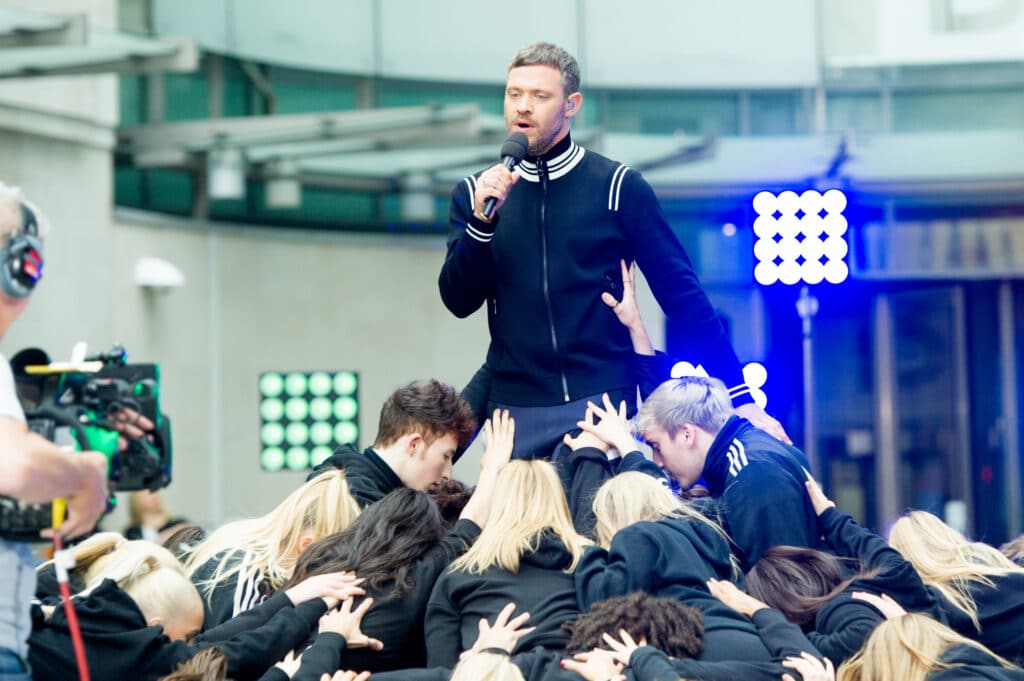Will Young wants you to know ‘everybody’s got bloody addictions’: ‘Just be honest!’

Will Young. (Shirlaine Forrest/WireImage)
Will Young is feeling pretty good about himself.
“I’ve done a lot of therapy, you know what I mean?” he tells PinkNews. “I’ve been doing it for a long time. I’m not really ruminating on anything.
“I just try to remind myself to get to that place of feeling empathetic towards myself.”
It’s taken him a while to get there. In recent years Will Young has earned a reputation for talking frankly and openly about the difficulties he’s faced – being diagnosed with PTSD as a result of childhood trauma, the shame he felt about being gay, encountering homophobia as an adult – and how he manages it all.
“I do it deliberately,” he explains. “I’m doing it to normalise it, so people can see someone in the public eye, in a mainstream space, just normalising it, rather than having a whole f**king hoo-hah.
“It’s just everyday life! It really is. Just a human being. Life’s hard enough, and we don’t get a choice in it.”
It should come as no surprise, then, that his latest ventures are all about wellbeing. There’s The Wellbeing Lab podcast, which sees the singer speak to mental health experts, and his new book Be Yourself and Happier: The A-Z of Wellbeing, in which he shows readers “how to identify destructive patterns, develop good mindful habits, be true to who we are and grow into better versions of ourselves.”
He’s certainly done “all of it” when it comes to seeking out rushes to ease the pain: “Over the years? Shopping, love – love, can be a kind of addiction, drink and drugs, but they never got me that badly.”

Will Young performs at Glastonbury Festival 2016. (Harry Durrant/Getty Images)
Will Young experienced shopping addiction
In Britain, compulsive buying disorder affects around eight to 16 per cent of the population, according to Priory. Will Young was once among them, and it’s for this reason that the first episode of his podcast, all recorded from his living room, is about shopping addiction.
It’s rarely discussed, he says, because “it’s not seen as quite as shameful”.
Shame is a feeling he has dwelled on a lot about over the years – the shame of addiction, the shame of being gay – but he’s trying his best to move past that erosive feeling.
“I’ve learned a lot to not shame myself. I remember quite clearly a few years ago working with this great therapist who doesn’t shame. It’s addiction, so who cares? Let’s go to what’s driving it.
“There’s no point sitting there going: ‘I’m an awful person’. It’s done. Let’s try and unpack it.”
“It normally comes down to something affecting our sense of self-worth. We need to reframe what addictive behaviour is, there’s a lot of shame around addiction – everybody’s got bloody addictions. Just be honest!”
I can pinpoint two times when I almost imploded.
Even shame can become a sort of “addiction”, Young believes. His first book, To be a Gay Man, unpacked his own experiences with gay shame.
“To feel gay shame is traumatic,” he explains. “I can pinpoint two times when I almost imploded. I didn’t know what to do. You think, God, there’s nothing worse than me because all the messages are: ‘It is the most disgusting thing to be gay.’
“You know how traumatic it is to be thinking, ‘God, I shouldn’t even be taking up space in the world’? I hope it’s getting better.”
There are countless outcomes to gay shame, but for an unfortunate few, this sense of self-hatred leads them to conversion therapy. Interested in exploring this, while writing To be a Gay Man, Young emailed a conversion therapy provider in Texas pretending to ask for help.
“I said to them: ‘I’m desperately ashamed of myself, can you help me?'”
“Obviously, they wrote back saying: ‘We can definitely help you with this’. No, you can’t, you motherf**kers.”

(Ollie Millington/Getty Images)
And he has a fair few more expletives for the British government. Ministers are currently legislating a long-delayed ban on the discredited practice, described by medical and mental health associations as well as human rights groups as akin to torture.
The Tories have been criticised for multiple delays to the ban (first promised by Theresa May in 2018), and for including loopholes for “consenting adults” in a draft released last year.
For Will Young, this wasn’t surprising. “We’ve got a government that has absolutely no empathy,” he says.
“I’m trying not to feel angry, to be honest, because it makes me feel hopeless. I don’t want to feel that but we are in quite a dire situation.
“I don’t want to be sensational, I mean, just look at how appalling the government is being on refugees. They basically gaslight us.
“I just watched a report by my friend, Robert Rinder, [who travelled to Poland to meet the Ukrainian family of his former Strictly partner, and has been reporting on the crisis].
“He’s so intelligent, empathetic, he’s a remarkable human being. He said there’s no UK [consulate] there. There’s nothing, and then they go to the European minister [James Cleverly] and he just lies. It’s sort of like Donald Trump.”
The British consulate in Krakow is closed ‘due to the pandemic.’ Though 130 miles away by road, it’s the nearest major city to the border.
🤦🏼♂️ pic.twitter.com/mjOBWhw7de
— Rob Rinder (@RobbieRinder) March 16, 2022
He notes that he tries to avoid the news as much as he can. It’s one of many boundaries that Will Young has put in place to protect himself.
“Once you start setting boundaries, your confidence increases,” he says. A test to this confidence came in 2020. As he defended a busker, in Oxford, a group of men lobbed abuse and threatened to stab him.
In that moment, he says, “something changed, and I just wouldn’t take it anymore” and he called on bystanders to help him – they did.
“I had the whole street on my side,” he explains, “and the whole street turned on those people. I actually felt quite protected by others.”

Will Young. (Brian Rasic/WireImage)
Shame had long been a barrier to Young feeling good about himself. But through therapy, he’s allowed himself to be vulnerable in a way that would have felt unimaginable years ago.
“Through all of that kind of work, we start having more empathy for ourselves,” he says. “We find understanding because often the biggest frustration is not understanding why we feel something. Why do I feel depressed? Why do I feel anxious? The brain doesn’t understand.”
He understands now, though, and he feels “calmer” because of it. But he couldn’t have done it alone.
“Particularly this stuff from the past, we need a professional to help us connect to that because it comes with a lot of energy, and it’s not pleasant. We need someone to help titrate those feelings.”
“Whenever I’m in a space when I’m sharing emotional stuff, so even now, I have to remind myself to do more of that, because you’re feeling good.”
“Once you start feeling deserving of what you require in life, your energy changes.”

